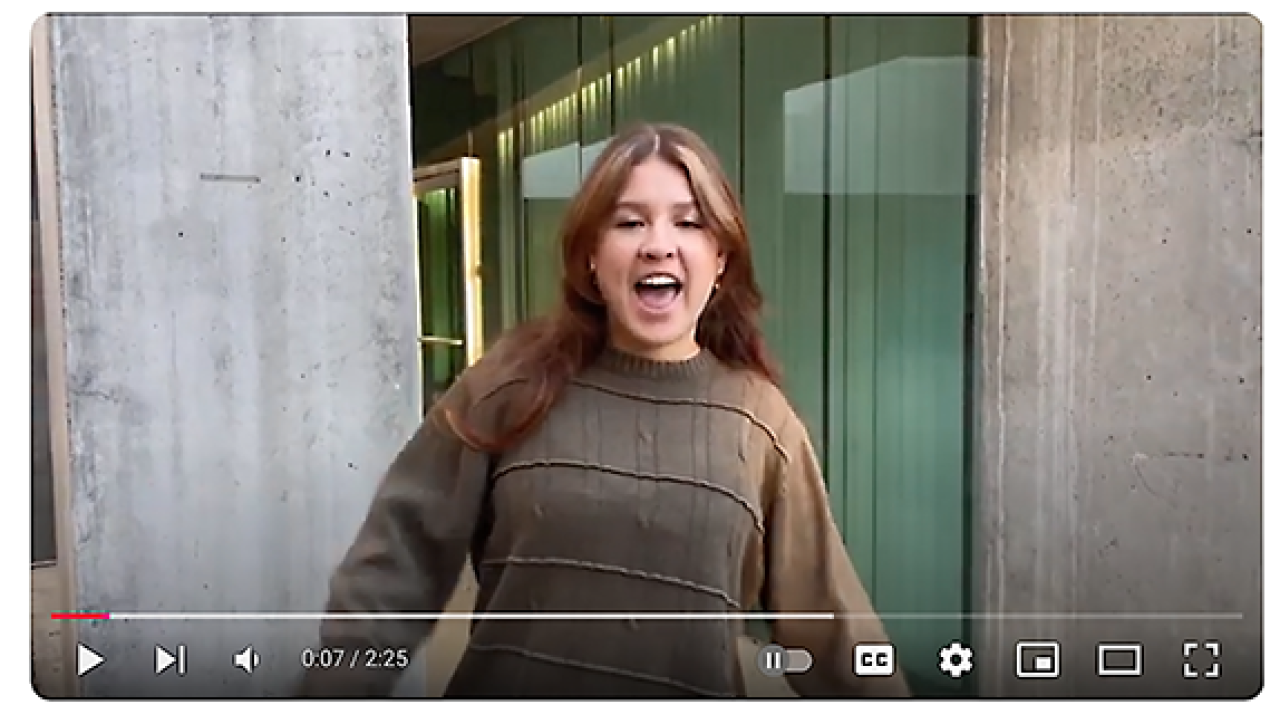
'Emma Vazquez on the Mike'
"It’s a diss track, no, it's the food waste diss track"

When UC Davis professor and agricultural entomologist Christian Nansen gives assignments to his students, he expects them to be thoughtful, insightful and creative. Sometimes they submit written reports, sometimes videos, but one student recently took an assignment to a whole new level.
She wrote, rapped and produced a video that awed her professor, her classmates and her friends.
Emma Vazquez--a second-year neurobiology, physiology, and physiology behavior major enrolled in his Urban Food and Security class, part of the Science and Society Program--submitted a 2.5 minute, fast-paced video that is posted on Nansen's UC Davis YouTube channel. (See https://youtu.be/2fILbd49Jvw).
The assignment: to review multiple course materials, including the professor's newly published article, “Active Learning, Living Laboratories, Student Empowerment, and Urban Sustainability" in the journal Sustainability.
Vazquez titled her video, “Food Waste Video Review: Diss Track.” The project continues to draw raves for its content, originality, creativity, rhythmic delivery, and animated expressions.
“It’s a diss track, no, it's the food waste diss track,” she began. “Emma Vazquez on the mike."
"One third of all our food is wasted fruits and vegetables are the most hated. In this article some tests are done using demographics, let's talk about it, son. 31% of uneaten food is due to the losses of all the consumERs. Come on U.S., we could do better. Let's reduce food waste and make our earth fresher.”
“Here’s tips we talked about in class, thanks to Christian and all those TED talks we watched,” Vazquez continued. “Number one, meal prep, and do not over buy, shopping list, and planning can help the food supply. Turning poop into power as crazy as it seems produces biogas that all the trucks need. You know, America is ranked third highest country for food waste per capita. We're throwing away about 73 k per year.” (Note about 160 pounds.)
'Insects Could Be a Nice Treat'
Vazquez briefly shared what two countries, Belgium and Australia, are accomplishing in their waste management programs, and then commented that “we need a substitute” for all the meat we eat. “I think insects could be a nice treat, they got all the assets that livestock don't,” she rapped, suggesting entomophagy.
“All right, let's slow it down and make one thing clear: reduce food waste, reduce food waste, no more food waste,” Vazquez emphasized.
The UC Davis student then called for “zero waste programs that reuse and recycle” and for “food waste to fight future hunger. Wish I had this knowledge when I was younger.”
“We out,” Vazquez concluded as she exited, then burst back to remind her audience “Just don’t waste food. Eat your leftovers.”
No Stranger to Video Projects
Vazquez, a native of southern California and a graduate of Norco High School, Riverside County, is no stranger to video projects. “I did a similar video project in high school for AP (Advanced Placement) Chemistry and was inspired by that! I’ve been familiar with video editing and audio production ever since I learned how to do it during the pandemic.”
In Nansen's class, "I became way more aware of how to decrease food waste and why it is important for our urban community," said Vazquez, who seeks a career as a physician’s assistant.
Nansen, a member of the UC Davis Department of Entomology and Nematology since 2014, says food waste is “a topic that students can relate directly to and also have almost complete control over in their daily lives.”
Science and Society (SAS), an interdepartmental teaching program administered by the College of Agricultural and Environmental Sciences, "offers students throughout the campus the opportunity to discover the connections that link the social, biological, and physical sciences with societal issues and cultural discourses," according to the SAS website. "Course work examines discovery processes in relation to societal values, public policy and ethics, including issues associated with cultural diversity. Whenever possible, opportunities outside the classroom are included as part of the learning experience."
The SAS program seeks to serve "students of all majors and interests."
And in doing so, students' multiple and unexpected talents surface.
"Emma Vazquez on the mike."
